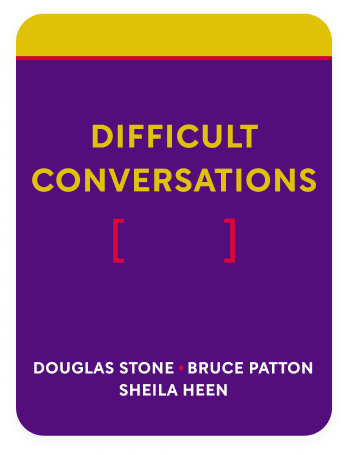

This article is an excerpt from the Shortform book guide to "Difficult Conversations" by Douglas Stone, Bruce Patton, Sheila Heen. Shortform has the world's best summaries and analyses of books you should be reading.
Like this article? Sign up for a free trial here .
Do you avoid having difficult conversations? What topics do you find difficult to talk about?
Most people avoid having difficult conversations because they fear the consequences that might arise when they bring up the issue. These issues tend to revolve around discussions of major categories (e.g. race, religion, gender, or politics) or matters that reveal our personal insecurities.
All in all, having difficult conversations may never be easy, but there are ways to make them as painless and as stress-free as possible.
Having Difficult Conversations Is a Delicate Art
A difficult conversation involves anything you find it difficult to talk about. Commonly, difficult conversations involve major categories like race, religion, sexuality, gender, or politics. But difficult conversations also include topics we feel insecure about, or issues that make us feel vulnerable, or matters that are important to us, or situations where the outcome is unknown, or instances that concern people we care about.
In short, the situations that require having difficult conversations are many and varied:
- You have to fire an employee at work who’s now an old friend.
- You overhear your mother-in-law criticizing your parenting style right before you go on vacation with her.
- You want to tell your father how much you love him, but it makes you both uncomfortable.
- Your neighbors’ dog has been barking nonstop at night, and you can’t get any sleep.
Difficult conversations are usually conversations where we fear the consequences, whether we avoid having the conversation or we raise the issue. And there are risks no matter how you choose to proceed:
- If we avoid the conversation, we risk having our feelings fester, or getting taken advantage of, or we rob the offending person of the chance to improve the situation.
- If we confront the issue, things might get worse. We could be rejected, or attacked. Our own feelings might get hurt, or a relationship might end.
There’s No Magic Wand
Some people think that there’s a tactful way to have a difficult conversation so that everything ends up fine. When it comes to having difficult conversations, tact is good, but it’s not the answer. The problems at the heart of difficult conversations run deeper than tact, diplomacy, or positivity.
“Delivering a difficult message is like throwing a hand grenade.” There’s no nice way to throw a hand grenade, and it’s going to do damage, even if you keep it to yourself. The same is true when it comes to having difficult conversations.
The first big-picture change to make is how we think of difficult conversations. We usually think of delivering or receiving bad news, as if it’s something that can be passed around and handed off. You’re either taking it, or you’re giving it. This is how difficult conversations turn into a war of opposite views: “I’ve got bad news, and you’re going to take it” is met with “I’m not going to take it — in fact, I’ve got bad news for you! You take it!”
It’s better to approach difficult conversations as learning conversations. Notice the shift in language: difficult, a negative word, to learning, a positive word that implies process and mistakes and progress.
Improvement requires change, and change is hard and awkward, and requires us to take an honest look at ourselves and break out of our comfort zone. But the rewards of improving will be worth the effort required. The principles in this book will help improve all your conversations, not just the difficult ones:
- You’ll find it easier to approach any conversation, and conversations will cause less anxiety.
- You’ll be less worried about what others might say or how they might respond, and you’ll feel freer to act in the face of tough situations.
- You’ll be more self-confident and have a stronger sense of self-respect and integrity.
- Your relationships will improve.
The question isn’t whether you’ve been searching “hard enough” for the solution to your issue, but whether you’ve been looking in the right places. The problem doesn’t lie in your actions or what you can do to make difficult conversations easier — the problem lies in your thinking.
For the Skeptics
It’s a reality that some situations will, unfortunately, be beyond repair, due to the people involved or the circumstances. But many situations will be positively impacted by the principles you learn here.
Having difficult conversations will always be difficult, but it helps to keep your goals realistic. You can’t eliminate anxiety, but you can reduce the anxiety you feel about having difficult conversations. You can’t achieve perfect results, but you can achieve better results.
The Root of Difficulty: The 3 Conversations
Difficult conversations are so hard because they’re actually 3 different ongoing conversations wrapped up in one:
- The What Happened Conversation. This conversation includes disagreement over what happened, who did what, and who’s right or who’s to blame.
- The Feelings Conversation. This conversation usually goes unsaid, and asks questions about our own feelings: Are my feelings valid or appropriate? Should I acknowledge or deny my feelings? What about the other person’s feelings?
- The Identity Conversation. This is an unspoken conversation that we have with ourselves. It circles around what this situation means about who we think we are. For instance, we might ask ourselves, “Am I a bad wife because I don’t cook or clean?”
And we make predictable errors in all 3 of these conversations:
- In the What Happened Conversation, we assume our perception is “right” and that we already have all of the information we need. Instead, we should explore what information the other person knows that we don’t.
- In the Feelings Conversation, we try to hide our feelings or we take them out on the other person. Instead, we should share them and manage them constructively.
- In the Identity Conversation, we ignore our true anxiety about what this conversation says about us. Instead, we should thoroughly explore the identities at stake for both people.
All difficult conversations contain all 3 of these conversations, and we can’t change the challenges inherent in each one — but we can change the way we respond to those challenges, and we can learn how to manage and address all 3 conversations to have better difficult conversations.

———End of Preview———
Like what you just read? Read the rest of the world's best book summary and analysis of Douglas Stone, Bruce Patton, Sheila Heen's "Difficult Conversations" at Shortform .
Here's what you'll find in our full Difficult Conversations summary :
- Why healthy relationships need difficult conversations
- The 3 conversations that happen within each difficult conversation
- How difficult conversations go wrong and what to do about it






